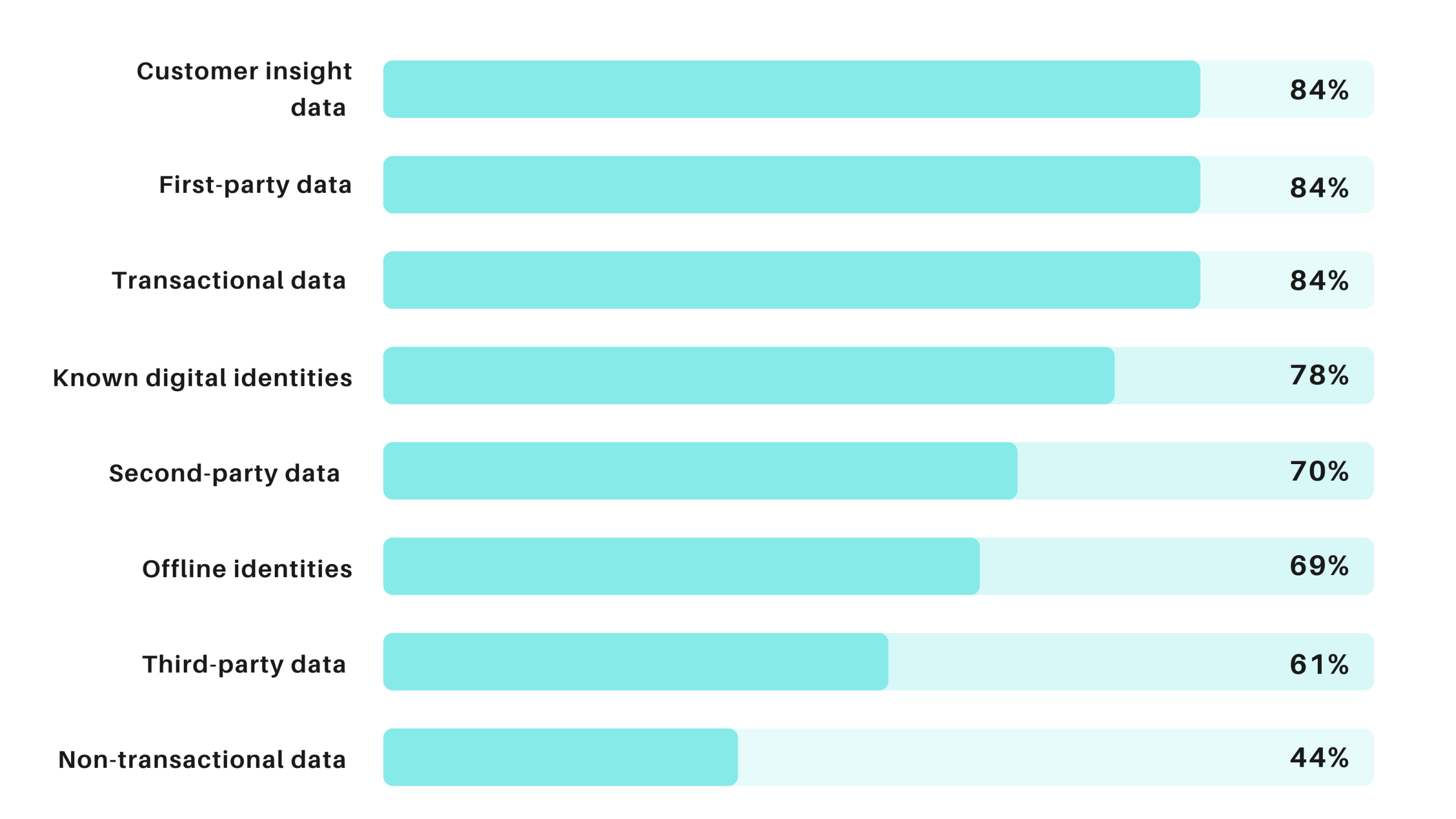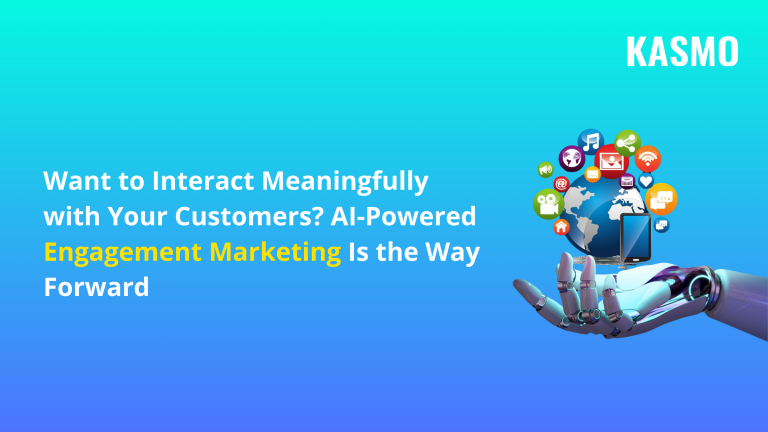AI Is Defining the Future of Marketing
Digital marketing trends and consumer expectations are constantly evolving with advancements in technology, AI and increase in connectivity. From chatbots and email campaign automation, artificial intelligence is transforming how marketers operate. Tasks that once took hours, like writing copy, analyzing data, or generating visuals, can now be completed within minutes.
AI for marketers in businesses enables the delivery of personalized, consistent customer experiences across all channels, at scale. AI is becoming central to modern marketing strategy and expanding its influence in everything from brand positioning and creative execution to the ethics in advertising.
What Is Engagement Marketing?
Engagement marketing is a cross-channel strategy that focuses on building meaningful interactions with customers to foster long-term loyalty. It combines tactics like:
- Email marketing
- Content marketing
- Social media marketing
- Marketing automation
These touchpoints help brands connect with customers in ways that are timely, valuable, and authentic. It could be through a helpful product guide or a thoughtful follow-up email post-purchase, engagement marketing is about forging real relationships, not just transactions.
By leveraging customer data from various sources, marketers can better understand customer behaviors, preferences, and intent. This approach enables your brand to deliver personalized experiences that build customer trust and enhances the buying journey.

Source: Salesforce
Why Relevant Customer Engagement Matters
Consumers are flooded with marketing ads and communication day in and day out, but only a few of these ads create a lasting impact. The key is to reach consumers based on their interests, through content and interactions that feel personalized and non-intrusive.
Most buyers are already familiar with a brand before their first interaction with it. That’s why your brand needs to create experiences that resonate with their preferences and values long before the sales pitch arrives. In a market where a product isn’t the only differentiator, your brand positioning is based on your customer engagement strategy.
AI is the Driving Force Behind Modern Marketing
According to Salesforce’s report, high performers (in terms of marketing and strategy) are 2.5x more likely than underperformers to have fully implemented AI within their operations.

AI is being adopted rapidly because of its crucial role in making the entire marketing process more streamlined and efficient by:
- Generating personalized content at scale
- Segmenting audiences automatically
- Optimizing campaigns in real-time
- Powering AI chatbots and virtual assistants
AI for marketers brings speed, efficiency, and precision across predictive insights, generative content, and more.
Consumer Trust
Consumers are increasingly sceptical about how their data is used, and where the boundary is drawn between relevance and manipulation.
In a survey conducted by Cognizant, a young respondent shared, “I’ve seen how positive AI can be, but I’ve also seen how scary and dangerous it can be,”. Another older respondent chimed in, “I don’t understand it, and that makes it hard for me to trust it,”. Overall, 44% of survey respondents fear that generative AI will compromise customer data privacy and confidentiality.
Ethical AI usage is now a competitive advantage. Transparency, data privacy, and responsible content generation will shape not only public perception but long-term brand success. In 2025, winning consumer trust will require showing how AI enhances their experience without compromising integrity.
How AI Enables Better CX
Let’s look at some key digital marketing trends driven by AI integration that enable businesses to deliver stellar customer experience:
Unified Data for Personalization
According to Salesforce, only 31% of marketers are fully satisfied with their ability to unify customer data sources. But unifying customer data is still the most strategic way of creating personalized, consistent campaigns.
Salesforce Marketing Cloud closes that gap. By integrating real-time data from various systems into a single view, your marketing team can respond faster and more effectively to customer needs.
Email Marketing
Email is still used as an outbound channel, but its role is shifting. Brands are moving from generic newsletters to dynamic, relevant campaigns that nurture customers throughout their buying journey. It is no surprise that 84% of marketers leverage email as a strategy for customer personalization.
For instance, an email campaign might begin with a thank-you message (for filling a form or showing interest), followed by personalized tips and educative content, then move into loyalty rewards and review requests. All these can be automated and customized through Salesforce Marketing Cloud.
Marketing Cloud can segment audiences in real time, generate recommendations, and automate mails in a timely fashion. All of these drive better engagement and stronger customer relationships.
Personalization at Scale
65% of consumers say they will stay loyal if the company offers a more personalized experience. Top brands now personalize marketing and ads for consumers across multiple channels. This includes email, digital ads, websites, mobile messaging, video, and social media.
Single-channel campaigns have been replaced by omnichannel, connected journeys that ensure that customers have a consistent brand experience. On an average, high performing marketing teams fully personalize for their consumers across six channels, compared with underperformers who fully personalize across only three channels.
Innovation in Marketing
89% of marketers say they must innovate constantly to stay competitive. This means your business needs to invest in technology to break down data silos, integrate data across teams, and experiment with AI to test, learn, and optimize engagement marketing in real time.
Agentic AI for CX
Consumers expect easy self-service for common queries. This creates a great opportunity for virtual assistants and chatbots to enhance customer experience online. Salesforce offers AI agents for customer support and self-service through its Service Cloud and Agentforce.
These AI agents offer 24/7 support, guide users along tailored self-service options which include FAQs, AI agents, and online resources like knowledge base articles. Service Cloud personalizes self-service by addressing customers by name, displaying their past purchases, and serving relevant offers based on their activity history.
This frees up time for your teams to focus on having meaningful interactions to build lasting customer relationships. Marketing teams can automate customer engagement in a manner that is adaptive, contextual, and customer-focused.
Marketing Cloud Engagement by Salesforce
Engagement marketing empowers marketers to create and deliver integrated, cross-channel campaigns for consumers with a personalization at scale. With AI integrated in every aspect of the buyer journey, brands can foster customer loyalty, automate complex workflows, and continuously optimize campaigns.
Here are a few features offered by Salesforce Marketing Cloud:
Email Marketing: Personalization at Scale
Your brand can streamline the management of promotional, transactional, and triggered emails within a single customer journey while tracking a performance in real-time. This enables timely, relevant communication and enhances employee productivity.
Content Builder: Design Relevant Campaigns
With a drag-and-drop interface, Content Builder makes it simple to build attention-grabbing emails. Your teams can upload content, choose prebuilt templates, or create their own designs. A centralized content library with automated approvals to streamline operations ensues seamless collaboration between teams.
Scalability: High Campaign Performance
Marketing Cloud supports dynamic content powered by AI at scale, ensuring your campaigns remain relevant, responsive, and performs well even under demanding market conditions.
Mobile Marketing: Reach More Customers
Your business can deliver seamless mobile experiences across SMS, push notifications, and third-party messaging applications. By leveraging conversational marketing, marketing teams engage customers with interactive content such as surveys and appointment confirmations. Additionally, push messages triggered by behavioral and geolocation data of customers help boost app engagement and maximize ROI.
WhatsApp: Conversational Marketing
Meta’s WhatsApp Business Platform can be leveraged to deliver high-impact, conversational experiences at scale. Messaging across marketing, commerce, and service touchpoints can be managed within this unified platform, powered by real-time customer data.
SMS Messaging: Timely, Targeted, and Trackable
Marketing Cloud enables your teams to create, manage, and optimize SMS campaigns with ease. Using templates and a drag-and-drop interface, you can send timely alerts and notifications. AI-powered insights help identify optimal timings and days to share communication with customers and list their most-used channels, improving customer engagement and maximizing conversions.
Journey Personalization: Automate Customer Interactions
Your marketing team can design and deploy personalized, end-to-end customer journeys using a user-friendly interface that combines messaging, content, and AI insights within a single platform. With the ability to automate actions like cross-sell and upsell based on behavioral data of customers, your brand can stay relevant to your target audience and respond appropriately to customer needs.
Cross-CRM Engagement: Deliver a Unified Experience
Salesforce integrations allow seamless connection between marketing, service and sales, teams. You can trigger contextual communication, for example, a follow-up email after a customer service interaction, using prebuilt or custom Journey Builder features that maintain consistency across every touchpoint in the customer journey.
Digital Advertising: Activate First-Party Data
With precise audience segmentation, your teams can run personalized, data-driven ad campaigns across platforms such as Google, Meta, and Twitter. Marketing Cloud highlights new audience segments for acquisition, and existing customers to reduce repetitive ads. By integrating digital advertising into customer journeys, your brand can deliver unified, omnichannel customer experiences.
Why Kasmo Is the Ideal Partner for Your Salesforce Implementation
Choosing the right implementation partner is crucial for your Salesforce success. At Kasmo, we bring deep technical expertise along with a strategic approach rooted in real-world industry experience.
As a trusted Salesforce Summit Partner, Kasmo has a proven track record of delivering tailored, scalable, and high-impact Salesforce solutions across industries. Our team of certified experts ensure that we align solutions with your business goals and drive measurable outcomes.
Conclusion
The integration of AI in engagement marketing is reshaping how brands connect with audiences and is driving digital marketing trends. Automation and AI for marketers have evolved far beyond operations and now enable more personalized customer engagement.
More businesses are integrating AI into their marketing efforts and have seen clear improvement in customer satisfaction. They are better positioned to deliver customer experiences that are empathetic and impactful. By partnering with Kasmo and implementing Salesforce, your brand can align with the future of marketing – which revolves around build lasting customer relationships, driving greater customer loyalty, and staying ahead of competitors.




